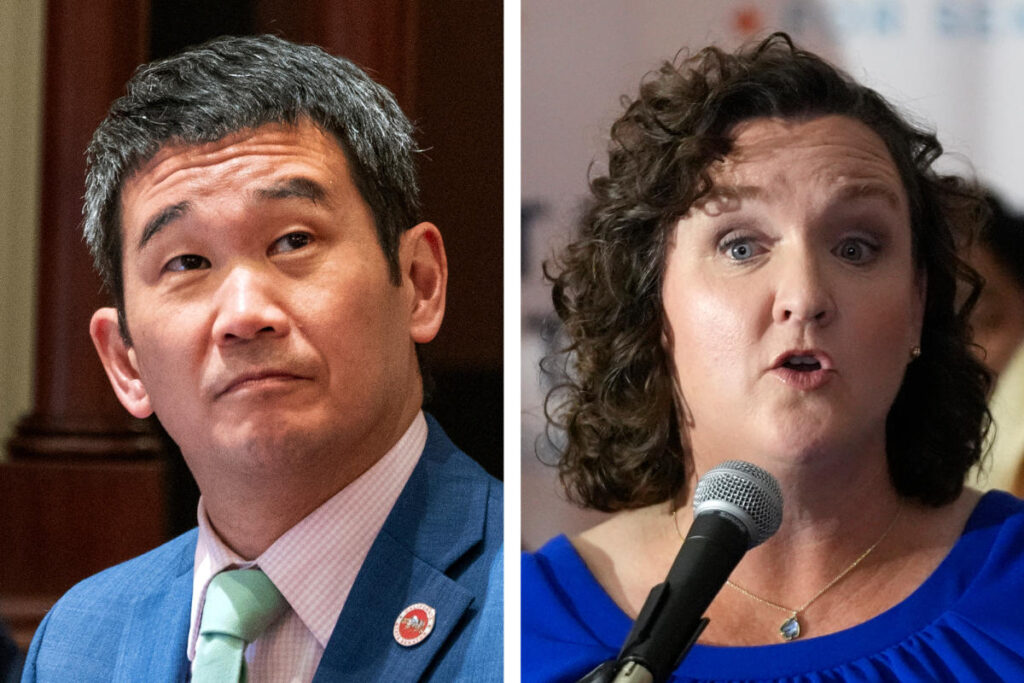The race to succeed Katie Porter in Southern California has drawn attention, but it faces challenges that dilute its prominence among House races nationally. While Democrats aim to consolidate their foothold in a historically hostile district, much of the financial focus has shifted to a neighboring Republican seat, indicating a more delicate situation surrounding the Potsender’s seat. Scott Baugh, a seasoned Republican and former state lawmaker who narrowly lost to Porter, is leveraging his three-year campaign to gain an edge. Amid a decline in Democratic voter registrations, state Senator Dave Min, although a competent fundraiser, hasn’t matched Porter’s previous fundraising prowess. Recent polling reveals a tight race, with some indicating Baugh may hold a slight edge. Democratic leaders are candidly recognizing that Porter’s exit has complicated their efforts to retain the seat, with one commenting, “This race would be a lot easier if she had not run for Senate.”
Despite her Senate aspirations, Porter continues to support Min. Having previously bested him in a primary, she is actively aiding his campaign through fundraising and strategic counsel. Min appreciates her insights, as they discuss his strategies against Baugh’s attacks, including staying focused on his accomplishments rather than taking the bait on distractions. Min expresses a deep concern about Republican leadership, claiming a potential rallying of figures like Trump and Baugh represents a threat to the values he holds dear, particularly those regarding the future his children will inherit. He characterizes Baugh as deeply flawed and corrupt, intent on painting him as a menace to House ethics and governance.
Min aims to provide a balanced approach to issues like housing, climate change, and gun control while defending his past against attempts from Baugh to portray him as overly progressive. He is dedicated to emphasizing his legislative history and focusing on the stakes involved in maintaining a Democratic majority, particularly in light of his observations about Baugh’s ethics. In stark contrast, Baugh projects confidence, dismissing attacks suggesting he is aligned too closely with Trump’s views while attempting to present himself as a moderate. He downplays claims of being extreme, asserting his belief in a need for party unity while critiquing the Democrats for their negative campaigning, attributing their strategy to failures on critical issues like crime and inflation.
Baugh has taken a nuanced stance on politics, expressing his belief that federal intervention in abortion matters, particularly in California, would be counterproductive. He embraces the claim of being a constitutional conservative while acknowledging the shift in the Republican Party over the years. Stressing practical governance, he suggests there must be compromise between parties as they navigate issues like the war in Ukraine, framing his support in terms of vigilance and accountability. He aligns this with his longstanding concerns regarding America’s rising debt and trade approaches, particularly focusing on drug-related crises linked to immigration challenges, signifying a proactive yet cautious campaign platform.
Min pushes back against Baugh’s claims regarding his record on crime and immigration, asserting his support for law enforcement and his commitment to sensible policies. He confronts accusations of advocating for lax restrictions by reiterating his stance that the U.S. must enforce its borders diligently. Min’s campaign narrative emphasizes integrity in his legislative service, juxtaposing it against Baugh’s character, which he refers to as clouded by past scandals involving campaign finance violations and ethics complaints. Min’s defense aligns with Democratic arguments in the race, painting their candidate as far more reliable and competent in public service.
The exchanges between Baugh and Min illustrate the fraught nature of modern campaigning, where accusations and counter-accusations reign supreme. Baugh’s emphasis on his history as a “constitutional conservative” does not entirely shield him from scrutiny regarding his party’s more extreme tendencies, especially in the current political climate. The battle, while poised to be intensely personal, centers around core issues affecting voters’ daily lives, from crime to immigration. Min remains resolute in his efforts to remind voters of what he sees as Baugh’s history, linking it to dubious decisions and past infractions. Overall, the dynamics within this race encapsulate broader national trends, reflecting the polarized and high-stakes environment as candidates leverage their narratives in pursuit of retaining or flipping a divided electorate.

